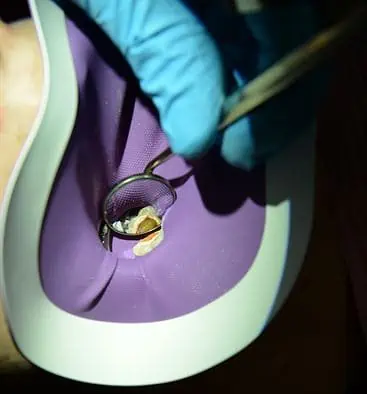Do you need help finding an endodontist near you? And what the heck is an endodontist anyway? In short, an endodontist is a dentist who specializes in root canal treatments.
This dental specialist also offers other dental services that have to do with the pulp and roots of the teeth.
We’re going to review more about endodontists, root canal treatments, and other aspects of endodontics.
But, if you need help finding an endodontist in your area now, you can call 866-383-0748 where you’ll be connected to a live operator 24/7 who will match you with a nearby dentist according to your exact needs.
What is an endodontist?
An endodontist is a dentist who has undergone additional training in procedures involving the pulp and roots of the teeth. ‘Endodont’ (endo-dont) is a Greek word that means “inside-tooth.” Endodontists specialize in performing treatments such as root canals and surgeries and often handle post-traumatic dental injuries.
Consider molar tooth removal—molars aren’t easily accessible and have several underlying canals that need to be delicately handled. Endodontists can perform this procedure efficiently because they have studied endodontics for an additional two years after dental school.
A general dentist can also perform a root canal treatment (for example, on anterior or bicuspid teeth). However, in the case of difficult areas, like molars, it’s always better to get treated by an endodontist because they have additional training and experience in exactly what you need.
An online dental consultation with a general dentist is a convenient and less expensive way to get an assessment and find out if you need a referral for root canal treatment or other specialist work.
This specialized endondontic treatment not only involves infected dental pulp removal but also includes preserving teeth that fail to respond to non-surgical treatments or have developed new lesions. With the help of advanced techniques, an endodontist can treat your tooth while minimizing as much of the discomfort as possible.
This short video from the American Dental Association (ADA) will help you get a better picture of endodontics.
How is an endodontist different from a dentist?
In addition to obtaining a degree in dentistry, endodontists complete an additional two years of specialization in diagnosing tooth pain and performing root canal treatments. This makes them more proficient and accurate when it comes to dental procedures involving critical areas of the mouth like the pulp and root.
Although general dentists can perform root canal treatments, they might still refer you to an endodontist if you’re in need of specialized treatments (for example, on molars).
Root canal treatment is a complex procedure and usually involves advanced equipment and technology like specialized microscopes, digital imagining, fiber optics, and ultrasound instruments. On average, endodontists perform 25% of all root canal treatments.
Why would I need to find an endodontist near me?
Endodontists perform root canal procedures, but they also treat issues like sensitivity to hot and cold food, chewing discomfort, dull aches, and gum diseases. Here are some other ways that endodontists can help you.
Endodontic re-treatment


Although the success rate of a root canal is nearly 80–85%, your tooth can develop new problems (like an infection or inflammation) post-treatment; in some cases it may even lead to root canal failure. There could be multiple causes of root canal failure, including:
- Incorrect oral examination
- Misinterpretation of radiographs
- Improper case selection
- Inadequate sterilization of instruments
An endodontist usually recommends surgery in cases where there are small fractures or hidden canals. They’re particularly skilled in the identifying infections in smaller crevices and identifying any calcium deposits.
Apicoectomy
Apicoectomy, a surgical procedure also referred as root-end resection, is done after a root canal to treat the infection that exists at the root end of the tooth. During this procedure, an incision is made on the gum tissue to expose the bone, and a small opening is created in the bone at the tip of the root.
After removing the underlying gum or bone tissue infection, a filling is added to seal the root canal and stitched up. It may sound daunting, but the recovery rate of an apicoectomy is similar to that of a root canal procedure.
Dislodged tooth treatment
Did you know you could actually reattach a dislodged tooth? It’s possible, but you shouldn’t try doing this at home. Leave this procedure to the experts, like endodontists. In case you’ve suffered an injury and your tooth has detached from the socket or become loose, you should immediately contact an endodontist near you or an emergency dental service for advice. Call 866-383-0748 today.
Traumatic dental injuries
Traumatic injuries that are a result of accidents can cause severe damage to your teeth and mouth tissues. In some cases, there might even be damage to the teeth pulp. Endodontists are specialized in handling cases that involve untreated calcified canals or infections that have not healed properly.
What is a root canal treatment?
Root canal treatment is used to repair and save teeth from decay and infection. As part of the process, infected nerves and pulp are removed, and the tooth is cleaned and sealed.
The root canal is the natural cavity at the center of the tooth. The soft area in between the root canal is the pulp chamber. Within the root canal lies a nerve that provides a sensation of hot and cold.
A decaying tooth, if not treated, can cause issues such as bacterial infection or a tooth abscess. If the infection deteriorates, it can also lead to swelling in other areas of the face or neck and loss of bone around the tip of the root.
A root canal treatment is used for saving teeth, but if the idea of a root canal seems a little off-putting, you could consider biological dentists, who avoid performing root canal.
The root canal process
This is how the procedure is generally carried out:
- The first step includes taking an x-ray to determine the shape of the patient’s root canals and the level of infection surrounding the bone. It may not be necessary, but local anesthesia can numb the area so that the patient doesn’t feel discomfort.
- After this, the endodontist places a rubber dam around the teeth to keep the area saliva-free during the treatment.
- An access hole is made with a drill through which the infected pulp, decayed nerve tissue, and debris are removed. To maintain hygiene, the area is cleaned using root canal files.
- Immediately after cleaning, the endodontist seals the opening using a sealer paste and a rubber compound called gutta-percha. Some doctors may want to wait a week to seal the opening to monitor progress and see if any infection develops.
- The final step includes the restoration of the tooth to protect it from breaking.
A root canal treatment is an intricate procedure and may require several visits to an endodontic specialist. Some endodontists may use laser treatment in addition to more traditional techniques. After the procedure, your tooth may feel sensitive due to inflammation, but this is manageable and temporary.
If you don’t see gradual improvement, or your pain worsens, contact your endodontist immediately. These may be symptoms of a possible infection.
Usually, the endodontist near you will prescribe over-the-counter pain medication to keep you comfortable at home.
How successful are root canals?
Root canal procedures are generally successful, and the failure rate for root canal treatments is low—less than 15%. Once the treatment is complete, the results can last for a lifetime.


But even if a root canal specialist has put in his best efforts to clean and seal a tooth, new infections can happen after the procedure. Undetected cracks in roots, recontamination in the area due to deficient dental restoration, and breakdown of sealing material with time could possibly complicate the procedure.
You can take some preventive steps like maintaining good oral hygiene, wearing a mouth guard while playing sports, and visiting dentists regularly. These measures can reduce the need for re-treatment.
How much does a visit to an endodontist cost?
People often get nervous when they hear that they need to get a root canal procedure. They usually get worried about two things: one is the stigma of the pain, and the second is the cost of the treatment. Let’s talk about the cost first.
Generally, the cost depends on a few factors:
- Your dentist’s location and rates
- The extent and complexity of the damage
- Tooth size (specifically, the number of roots and canals)
- Tooth position (the back teeth tend to cost more)
The cost of a root canal procedure would likely be similar regardless of if your general dentist or endodontist performs the procedure. Although the endodontist near you may charge a premium for specialized care and expertise, the difference is usually not significant.
Of course, dental insurance will offset some of the costs. You can also opt for alternative forms of dental financing. That said, on average, a root canal treatment will cost you somewhere around $700 for a front tooth and $1,000 for a molar.
Now as far as the pain is concerned, we understand that it may seem intimidating. Talk to your endodontist about your concerns and ask for suggestions regarding pain management. In some cases, they may suggest an alternative treatment.
The following table discusses the different alternatives to root canal treatment and their average costs:
| Treatment type | Description | Average cost |
| Tooth extraction | The problem tooth is removed entirely. | $75–$800 depending on if it’s a simple, surgical, or wisdom tooth extraction |
| Pulp capping | Closes the entrance of the pulp with a sealant. | About $120 |
| Dental bridges | The tooth is removed and replaced with a dental bridge, which is similar to dental crowns. | $500–$5,000 depending on the type of bridges. |
| Dental implants | An artificial tooth root that’s surgically inserted into the jawbone to hold a prosthetic tooth or series of teeth in place. | $1,500–$6,000 per tooth |
Endodontic Treatment Financing Options
Visiting an endodontist usually means you need some pretty complex treatment, and the cost can add up quickly. Let’s look at a few ways to can ease the financial burden.
Dental discount plan
Dental discount plans are affordable, flexible ways to reduce the cost of traditional dental insurance. With a discount plan, you pay an annual fee instead of monthly installments or dental insurance premiums.
With a discount plan there’s no third-party insurance company involved and you directly pay the discounted rate to the endodontist. Also, these plans are useful when there’s an unexpected dental emergency and you can’t afford to delay getting treated.
Dental insurance
You can claim the cost of the treatment through dental insurance; however, whether or not your insurance will cover your root canal procedure will depend on your particular plan. There may also be a waiting period. Often, you end up paying a portion of the cost and your insurance will cover the rest.
Endodontic schools
Instead of going to a traditional clinic, you can opt for endodontic schools that provide the same care at much more affordable rates. Not every area has an endodontic school, but many areas do have general dental schools where you can receive certain treatments.
Finding an endodontist near me
Dental issues can sometimes require immediate care and you may need to find a specialist urgently. So instead of rushing to find a dentist at the time of an emergency, you should probably have a few contact numbers or reference sources ready beforehand.
Start with referrals from your dentist. Make sure your dentist understands your budget concerns and insurance coverage. If you’ve chosen a dental discount plan, the plan provider can refer you to an endodontist who accepts it.


You can also look for endodontists online using the key phrases like ‘endodontists near me’ or ‘endodontist in my area.’ Read a few reviews about them before choosing a specialist.
Phone directories and newspaper ads are other viable options that you can explore. You could also check with your local health department about affordable and discounted dental services near you.
Though the above sources are great to find an endodontist near you, if you’d like to skip the hassle of calling around everywhere and get connected to an endodontist quickly, you can call 866-383-0748 to get connected right away.
The endodontist will need to know your medical history and any prescriptions you may take. After reviewing your records, the endodontist will perform a dental x-ray to determine the status of your tooth and recommend appropriate action.
What can I expect from a root canal specialist?
Understanding the root canal process is one way to ease any anxiety you may have about the procedure. Usually, it feels just like a routine filling.
To ensure you don’t feel any pain during the procedure, the endodontist will administer local anesthesia to the affected area. Next, the endodontist will drill a hole into the tooth and remove any infected tissue and debris. Following the cleaning, the endodontist closes the hole with a special sealant solution.
Once the anesthesia wears of, you can expect some soreness or pain that will diminish over time. You can take over-the-counter medication to manage the pain, eat softer foods to avoid discomfort, and brush your teeth as usual.
Conclusion
Dentists and endodontists both specialize in dental care but have different skill sets. Dentists take care of your teeth, gums, and oral wellbeing, while endodontists specialize in performing procedures related to the interior of the tooth and pulp.
Although both experts have overlapping practice areas of expertise, endodontists can provide more precise care in diagnosing tooth pain and gum tissue injuries, in addition to performing root canals.
FAQs
Is a root canal treatment painful?
Endodontists take care to numb the area with anesthetics to ensure you don’t have any discomfort during the procedure. You may experience some soreness once the anesthetic wears off. However, that can be treated with pain medication (usually over-the-counter). If you experience extreme pain even with pain medication, you may need to contact your endodontist.
How do I find an endodontist near me?
Reaching out to your dentist would be the best way to locate a nearby endodontist, or you could also try searching online. For a quick way to locate a root canal specialist, call 866-383-0748.
What is the difference between a pediatric endodontist and an adult endodontist?
Pediatric endodontists work with children’s growing teeth. Pediatric endodontic treatment focuses more on issues related to cavities, traumatized teeth, and developmental anomalies.
American Association of Endodontics: Myths About Root Canals. Consulted 13th August 2020
Mouth Healthy: Root Canals: FAQs About Treatment That Can Save Your Tooth. Consulted 15th August 2020
American Dental Association: Root Canal Treatment. Consulted 18th August 2020
American Association of Endodontics: Myths About Root Canals. Consulted 13th August 2020
Mouth Healthy: Root Canals: FAQs About Treatment That Can Save Your Tooth. Consulted 15th August 2020
American Dental Association: Root Canal Treatment. Consulted 18th August 2020




